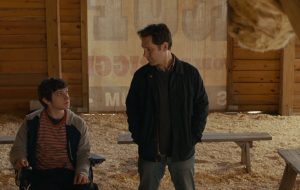
There’s nothing new in “The Fundamentals of Caring.” It’s as formulaic as a film can get. From the second the film starts, you know exactly where the story is going to lead to. Writer/director Rob Burnett takes no chances, getting the film from point A to point B in the safest way possible. And yet, I found myself quite enjoying the film.
Almost all of the credit for the success of “The Fundamentals of Caring” goes to the core players. Some must go to Jonathan Evison, the author of the novel this film is adapted from, though I’m ignorant to how his novel played out, so giving him credit would feel like a bit of a lie. I assume it’s as simple and safe as the film, though assumptions are the mother of all screw-ups. What I do know is that Burnett’s direction is simple and safe, though he does subvert our expectations on occasion. Nothing outside the comfort zone the film resides in, but enough to catch us by surprise and make us smile.

The simple and safe story centers on Ben (Paul Rudd) and Trevor (Craig Roberts). Ben is the caregiver to Trevor, an eighteen year-old man suffering from muscular dystrophy. Trevor and his mother, Elsa (Jennifer Ehle), have just moved to Washington from the United Kingdom, which is the biggest risk in Trevor’s life. He goes through life doing the bare minimum, following a routine of watching television, eating the same meals at the same time every day, and cracking wise any chance he gets. The only time he exits the comfort of his home is to go to the park, always on Thursday, always from one to four. He fears that Murphy’s Law will swallow him whole if he deviates from the routine.
Ben is also stunted, though more emotionally so. He lost his son three years ago, with cheap flashbacks spelling out the cause of death. His wife, Janet (Julia Denton), wants a divorce, but Ben keeps running from it; figuratively and literally, as we seen him constantly dodging receiving his court order. We know he’s taken this caregiver position as a way of redemption, no matter how much he denies it. Does he honestly think no one will suspect him of this after agreeing to take care of a sick young man as his first caregiving position? Trevor sees right through it just as we do.

It’s the dynamic between Ben and Trevor that won me over. Paul Rudd and Craig Roberts bounce off of each other seamlessly, developing a delightful rapport. Trevor will call Ben on his bluff and vice versa. Trevor knows Ben is the right man for the job after asking him how he’d wipe his ass: Ben states he’d wipe it so well that there’d be no shit left. Paul Rudd was the perfect choice for this role, as his laidback sarcastic attitude and warm personality is the perfect match for the sardonic angst of Roberts’ Trevor. We’re willing to forgive many of the film’s shortcomings and forced clichés because of how much we like this duo.
Ben eventually convinces Trevor (and his mother) to go on a road trip and see the sights he marks on his map. This plays out exactly as you think it will, with the two encountering hitchhikers, odd landmarks (such as the world’s biggest bovine and the world’s deepest pit), and finding themselves along the way. One of the hitchhikers, Peaches (Megan Ferguson), is a pregnant woman whose car broke down on her way home to Nebraska. Ben and Trevor give her a lift because she needs to be the emotional breakthrough Ben needs to get over the loss of his son. That and Burnett can get a few good gags out of her.

The other hitchhiker is much more vital to the story. She is Dot and she is played by Selena Gomez, getting the opportunity to play against type. Dot is a runaway hitchhiking to Denver to start anew. She’s chosen Denver because her deceased mother always thought highly of it. She is self-centered and spouts expletives as if her life depended on it, so we know she’s going to be won over and be softened by Trevor. Gomez and Roberts have such a sweet chemistry together that we are forgiving of the shortcomings and forced clichés that envelop their courting, much like we do with Rudd and Roberts’ relationship.
Rob Burnett does deserve some credit. He may not take any chances with the story, but he is observant of what makes it work. He writes cheesy but charming dialogue that the actors deliver with verve. The way in which he has Trevor convince Dot that he’s an asshole that she’s drawn to by being sweet and not acting like one, which goes against her wishes like an asshole would do, is so endearing. As is the way in which Ben and Trevor play cruel pranks on each other, such as pretending to be choking or acting as if Trevor’s much-needed medication was misplaced. Even Trevor’s encounter with his father, who abandoned him when he was three because of his muscular dystrophy, plays out exactly as we expect, but it tugs at our heartstrings in spite of how forced it comes across as.

“The Fundamentals of Caring” is a vanilla film, no doubt about it. Many will be sickened by how sweet and trite it is. And yet, I found it to go down smoothly. Not without moments where I felt I was being choked by its forcefulness, but also not without its moments of joy. I found myself smiling more times than I was rolling my eyes, so much so that I almost welcomed those latter moments with open arms.
Final Rating: B
